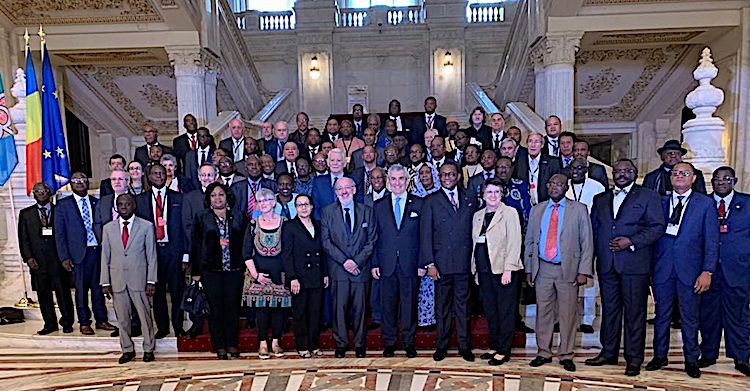By Robert Johnson
BRUSSELS (IDN) – Parliamentarians of the compact of more than 105 countries of the African, Caribbean and Pacific (ACP) Group and the European Union (EU) are demanding “a greater presence” at the United Nations (UN). As a minimum, an ACP-EU coordination unit should have a seat at the UN, says a landmark resolution of the ACP-EU Joint Parliamentary Assembly held in Bucharest, the capital of Romania. It also pleads for “permanent ACP-EU working mechanisms across UN special agencies and other global institutions to enhance the global visibility of the ACP-EU partnership.”
The authors of the ‘Resolution on the strategic significance and dimension of the ACP-EU partnership’, emerging from the 37th Session of the Joint Parliamentary Assembly (JPA) March 18-20, 2019 have asked the Assembly’s Co-Presidents to forward this resolution to the ACP-EU Council of Ministers, the European Parliament, the European Commission, the African Union, the regional organisations of the ACP states and the United Nations Secretary-General.
The Resolution further urges the 79-nation ACP and the EU to remain committed to working together on strengthening the rules-based international order by promoting effective multilateralism, with the UN at its core.
[Read ‘Moving the ACP Group to Centre Stage of Multilateralism’ by ACP Secretary-General Dr. Patrick I Gomes]
The Resolution advocates the continuation of the financial support for the development component of the post-2020 ACP-EU partnership agreement and calls for an approach that improves the quality of provisions such as health and education services.
The ACP-EU JPA urges the “discontinuation of aid conditionality linked to migration cooperation, as this is incompatible with international development effectiveness principles;” and recalls that “development assistance should not be used to finance security or military programmes.”
The parliamentarians of the ACP Group and the EU regret the current inability of host countries and countries of origin to effectively tackle irregular migration flow, and “deplore and condemn the loss of life and practices such as slavery and ill-treatment that have affected thousands of migrants, especially African migrants.”
The legislators call for a future ACP-EU partnership “based on the principle of pooled sovereignty, of a genuine political and strategic institution, as is required to tackle global challenges such as climate change, poverty, inequalities, migration, good governance, peace and security and terrorism.”
The Resolution insists that the new partnership make tackling climate change a key component of joint ACP-EU collaboration at global level, with the aim of meeting and surpassing the Paris Agreement climate goals;
It also emphasises the need for a digital dimension to the new strategic partnership, including greater collaboration on research and development, particularly as regards innovation for the benefit of development;
The Resolution further calls for the 2030 Agenda and the Sustainable Development Goals (SDGs) to be placed at the centre of the compacts; believes that the implementation of the Agenda requires legitimacy, proximity, subsidiarity and strong participation of local authorities and non-state actors to make it effective; and in particular, underlines the need for ‘localisation’ of the SDGs at local and territorial level and the need for articulating actions from local level up to regional and continental level.
The JPA underlines that Policy Coherence for Development (PCD) is a key element for achieving the new SDGs; believes that the new framework of cooperation should promote PCD; calls, in order to contribute to achieving the SDGs, for the setting of clear objectives, to be attained by 2030,in areas such as health, education, and the fight against hunger and poverty;
Furthermore, it calls for a future agreement that is complementary to wider EU and ACP strategies, to the African Union’s Agenda 2063, and to the deepening and widening of regional integration in the Caribbean and Pacific;
The JPA in addition considers that the existing ACP framework should remain the legally binding centre of gravity for a future partnership that covers all three regions – Africa, the Caribbean and the Pacific – while reinforcing the role of each and taking into account their growing specificities through the proposed legally binding regional compacts;
The JPA recognises the increased importance of regional organisations and sub-regional integration within the ACP Group and believes that this should be reflected in the post-Cotonou partnership; stresses, however, the need for coherence and complementarity between the sub-regional, regional and global strategies.
It reaffirms its commitment to the principle of subsidiarity, which encourages decision-making at the most relevant level of responsibility, be it national, regional, continental, or ACP-wide; and calls for the ACP-EU institutional mechanism to be strengthened.
The ACP-EU parliamentarians emphasise the importance of supporting ACP states’ economic development through increased Foreign Direct Investments (FDI) and mutually beneficial trade relations that focus on developing local economies, creating sustainable jobs and ensuring food security.
They insist on the necessity for ACP states to trigger the diversification of their economies and for the EU states to support the transition from economic dependency on raw materials exportation, especially in African states; and recall the importance of the future partnership being rooted in the Sustainable Development Goals, with the eradication of poverty remaining a core priority.
They further reiterate that the Economic Partnership Agreements (EPAs) should constitute a basis for regional cooperation and that they must be instruments for development and regional integration.
They call for greater action within the framework of the Strategic Partnership to combat tax evasion and avoidance, which is depriving both EU and ACP countries of vast amounts of income, and advocate a future partnership that will allow for asymmetrical terms of trade, and that this be defended at a multilateral level within the WTO (World Trade Organisation) in order to move away from a donor-recipient relationship. [IDN-InDepthNews – 6 April 2019]
IDN is flagship agency of the International Press Syndicate.
This report is part of a joint project of the Secretariat of the ACP Group of States and IDN, flagship agency of the International Press Syndicate.
facebook.com/IDN.GoingDeeper – twitter.com/acp_idn – twitter.com/InDepthNews

